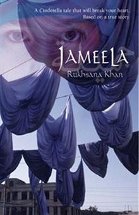Jameela by Rukhsana Khan

Allen and Unwin, 2010. 978 1743272594
(Ages 10-13) When Jameela's mother dies in their small home in a
village in Afghanistan, her father resorts to smoking opium, coming
home a few days later with news of moving to Kabul. Jameela must pack
her few belonging, the rest of the goods and the house having been
sold, and they stay in a friend's house in the city while father finds
work. Jameela's life is in turmoil, but none more so when father
announces he is to remarry. His new wife treats Jameela harshly, and
when she spies a friendship between the disfigured girl and her son,
persuades her father to do something more permanent. On the pretence of
going shopping at the market, Jameela is left by a shop. She waits all
day, only the kindly butcher, realising what her father has done,
offering her food and water, then shelter for the night. He and his
wife cannot keep her and so take her to the orphanage, where a new
world opens up for her.
Here she learns to read and helps the teacher in the classroom. When
soldiers come to the orphanage they inspect her face, despite trying to
keep her porani about her, and she is taken away and her lip fixed. At
the orphanage she befriends Soraya a young girl, who develops a plan to
get back at the mother in law, when she comes to the orphanage seeking
Soraya as a wife for her son.
A Cinderella story for our times, this marvelous book, suffused with
Afghani words and phrases, infused with the sights and sounds of
Afghanistan at war, will help to enlighten its readers as to how
children survive in a war ravaged country where food is always short,
parents make horrific decisions, and compassion comes from the most
unlikely of quarters. Readers will empathize with this young girl as
she tries to find a place to call home, struggling with the strange
girls at the orphanage, trying to keep up her religious views despite
opposition and distraught at her father's decision to abandon her. She
is a strong minded young girl, a character with whom readers will
immediately identify. That it is based on a true story adds piquancy to
the mix, increasing its appeal. A glossary at the end adds new words to
the readers' vocabulary, and gives them a peep into the world of an
Afghani girl.
Fran Knight